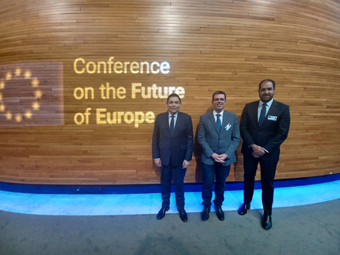Press Office
Strasbourg, 10 April 2022
Greek delegation addresses Plenary of Conference on the Future of Europe

The Conference proceedings at the plenary on the Future of Europe were held in Strasbourg from 7 to 9 April. The Greek Delegation consisting of Dimitris Kairidis, Ioannis Kefalogiannis and Ioannis Bournous, participated actively, taking the floor to comment on a number of issues. In particular:
With regard to the issue of migration, Mr Kairidis noted that the proposals tabled were of high quality, highly ambitious and practical-oriented thus achieving complete consensus in the component of national parliaments. Summarizing the proposals, Mr Kairidis underlined the following: a. migration is a phenomenon that cannot be abolished and it should be better managed b. there is a wide division of responsibilities regarding the management of migration so there should be better coordination at national and European level, more transparency, clarity, accountability and financial resources c. there should be more effective security of the external borders and protection from hybrid attacks such as the ones that hit Europe recently from Belarus and in 2020 from Turkey. Finally, he stressed the importance of the complete respect of human rights and international law.
With regard to the topic of values and rights, rule of law and security, Mr Kairidis stressed that the war in Ukraine reminded us that we are in a state of emergency and war against authoritarian regimes while democracy in Europe is under attack and in danger. He encouraged citizens to take into consideration in their proposals this emergency situation that we face and involves the retreat of democracy and the rule of law in many member states of the Union, elements that in his opinion, have not been included in this important text.
In the topic of education, culture and youth he mentioned that democracy is based on the preferences of voters. However, the paradox in democracy, noted the head of the Greek delegation, is that the youth cannot express themselves due to their non-participation in the electoral process. This gap that excludes the youth from the decision-making process, is reflected in a number of decisions, such as those involving the climate. He concluded by suggesting that every legislative initiative should include the results of the impact over a period of 25 years, as a safety valve for future generations.
Mr Kefalogiannis addressed the issue of digital transformation and argued that the Conference should conclude with specific and measurable conclusions and results, that will be aligned with the views of the citizens, as expressed during the plenary discussions at national and European level. In particular, on the issue of digital transformation, his working group focused on three issues that should be included in the conclusions. Firstly, the financial support of the island areas so that they will not lag behind on the issue of digitalization. Secondly, the full support of the middle-sized enterprises, which represent the backbone of the European economy and they should be the leaders of digital technology and their integration in the production process. He concluded that towards 2030, a year characterized by strong global competition, emphasis should be placed in the specialization of the new generation of workers in the fields of artificial intelligence, cyber-security and quantum computing.
Referring to the issue of migration, Mr Bournous argued that the European leadership failed to impose a united response to the management of refugee flows. With regard to the new pact on migration and asylum that is currently under negotiations, he stressed that member states that do not wish to accept refugees into their country, can legally donate money to front-line countries. Moreover, a huge amount of money is given for the construction of huge refugee camps on the East Aegean islands. He also stressed that because of the war in Ukraine, Europe is taking in new refugee flows and expressed his hope that countries such as Poland, will change its attitude towards refugees since these countries are directly affected by this war. He concluded that Europe as a whole should implement compulsory solidarity in terms of its migration policy.
During his speech about the unity of the European democracy Mr Bournous declared his support for the amendments of the European Trade Union Confederation which promote an inclusive European democracy that empowers workers, promotes equality and extends democracy in the workplace. Moreover, he supports the proposal for Treaty changes such as the constitutionalisation of the European Pillar of Social Rights, a social progress protocol and a Health Union as well as the reopening of the discussion about a Constitution for Europe. In closing, he mentioned that citizens in this conference proved their willingness to save the European Union from an inevitable decline, stressing that we should not disappoint the European nations again by succumbing to procedural obstacles and the plan of chauvinist forces to block almost everything.
Back